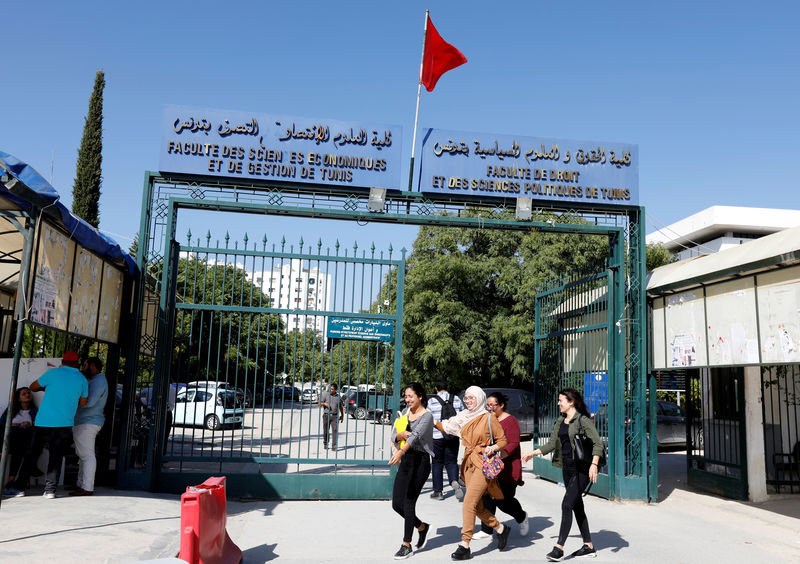By Tarek Amara and Angus McDowall
TUNIS (Reuters) - As the crowds gathered outside the ornate, colonial-era theater in Tunis' Bourguiba Street after exit polls declared a landslide election win for Kais Saied late on Sunday, Amel Bahrini decided she had to be there.
"Yesterday I went to celebrate and the atmosphere was like the atmosphere of revolution and the joy was great," the 22-year-old said.
Exit polls said about 90% of young voters backed Saied, a surge of generational excitement that Bahrini and many of the other students standing outside Manar university on Monday compared to the 2011 uprising that inspired the Arab spring.
Habib Bourguiba Street, a tree-lined boulevard running from the principle gate of the Kasbah down to the Tunis port, was the focal point of the massive protests eight years ago that forced the old autocrat Zine El-Abidine Ben Ali to flee.
On Sunday night, the crowds there were again chanting the old revolutionary slogans and singing the songs of spring that helped to inspire uprisings across the region that eventually toppled three other Arab leaders.
Many of the young people who voted for Saied on Sunday, however, were only children when their parents and older siblings marched in the streets to demand political rights.
Now, after years of economic malaise and coalition governments featuring many of the old politicians prominent in Ben Ali's day, they have helped elect a man who walked with the protesters during the revolutionary nights of 2011.
"I saw the revolution on television," said Bahrini, who was 13 at time of the uprising.
"The difference is that yesterday there was just great joy and at the time of the revolution it was also mixed with fear because there was violence," she added.
'TALKING TO OUR HEADS, NOT OUR STOMACHS'
Saied, who is backed by both Islamists and leftists, and who has conservative social views but wants to focus on introducing an experimental form of direct democracy, spent almost nothing on his campaign.
By contrast, his opponent, Nabil Karoui, had a big advertising platform, owns his own television station, had ties to the old Ben Ali government and faces a trial on corruption charges, which he denies.
Karoui's distribution of food aid - constantly replayed on his Nessma TV channel - earned him the nickname Nabil Macaroni.
Economic issues, poverty and unemployment are particularly acute for young people - who have a higher rate of unemployment than the national average.
However, for the dozen students Reuters spoke to at the university on Monday, it was not anything Saied had said about the economy that impressed them, but his incorruptible reputation.
"Saied is clean and represents us. We know very well that he does not have a magic wand," said Bahrini.
She was standing outside the science faculty at the Farhat Hached campus of Manar university perched on a hill above Tunis. A small poster of Saied was stuck to a wall nearby. All the students Reuters met were Saied supporters.
"He was talking to our heads, not to our stomachs," said Dia Hak, a tall young man wearing a sports t-shirt.
Outside the law faculty, where Saied worked for many years until his retirement shortly after the revolution, law student Cynthia Tawali, 19, said she had confidence in his reputation.
"Everyone here at the university says he was good," she said.
